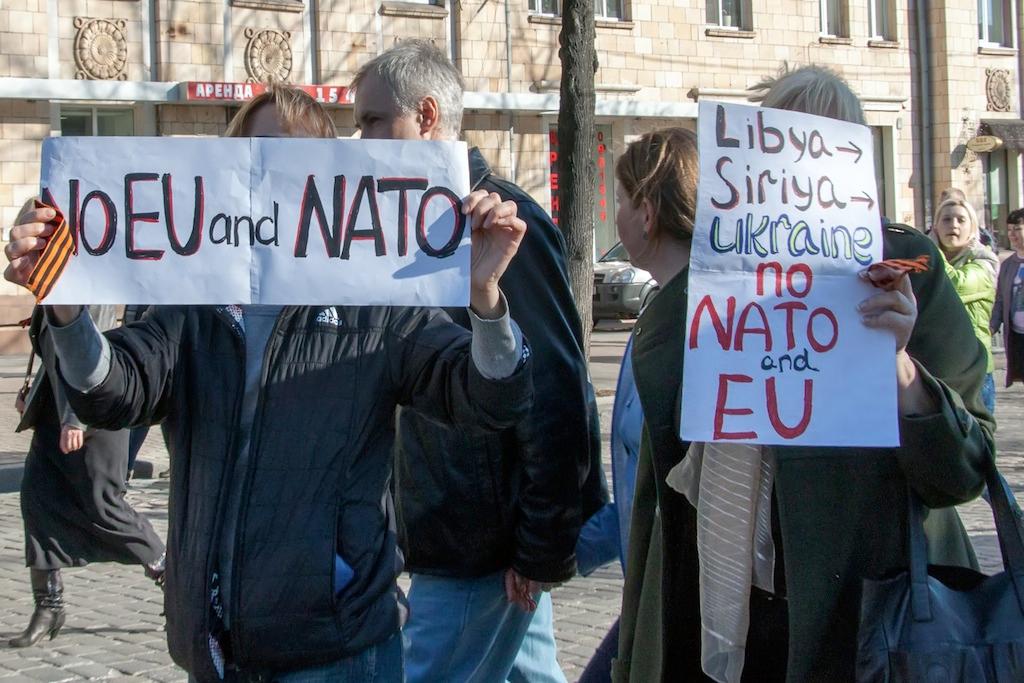EU can be a more effective counter to Russia in Ukraine than US
Pro-Russian protesters holds placards reading “No EU and NATO!” and “Libya, Syria, Ukraine” during a rally in the eastern Ukrainian city of Kharkiv on March 23, 2014. Crimea’s rebel leader urged Russians across Ukraine on Sunday to rise up against Kiev’s rule and welcome Kremlin forces whose unrelenting march against his flashpoint peninsula has defied Western outrage.
CAMBRIDGE — The Ukrainian revolution has revealed the European Union as the main driving force in advocating pro-Western change. Lasting political and economic change can emerge from Ukraine’s otherwise stalemated situation only with a strong role by the EU, rather than the United States.
Russia’s de facto annexation of Crimea shows that Moscow is largely immune to Western protests and financial sanctions against its officials or institutions.
Putting the EU in the front seat on the economic front would maximize Ukraine’s independence and stability in its difficult situation. The EU represents the most efficient permanent counter-incentive to Russia’s powerful financial reserves that threaten to pull Kyiv eastward into the Russian orbit.
Ukraine’s new leadership needs a rapid bailout in the face of looming bankruptcy. Its search for growth and investment will shape its long-term aspirations as a European country.
Ukraine’s provisional government offers a window of opportunity in declaring it will sign the Association Agreement with the EU. This is the very same agreement that provoked the Ukrainian crisis in the first place.
The EU Commission has pledged $15 billion to keep the new government in Kiev financially afloat. This is equal to the subsidy former president Yanukovich initially negotiated with Moscow. By comparison, the United States has promised $1 billion, while an agreement with the International Monetary Fund is likely only after national elections in May.
The EU has the means to balance the economic David-Goliath relationship between Kiev and Moscow. The struggle for Ukraine has intensified to the extent that the EU is willing to overcome its own internal debt crises.
Reforms will be extremely painful for Ukraine. In the long run, everything will depend on EU members’ political willingness to invest in Ukraine. The EU needs to rethink its policy toward the East that puts Ukraine in the same category as a dictatorship like neighboring Belarus.
A trade agreement with Ukraine should involve reciprocity in the gradual reduction of trade tariffs. The expectation is that the agreement would attract investments and capital, which in the long run improves conditions for deeper integration with the European market.
Talks about eventual EU membership, however, can only give Ukraine’s leadership unrealistically high hopes and further inflame Russian separatist sentiments.
The Ukrainian crisis itself has been an example of the necessity of European rather than American intervention.
Poland, Germany, France acting on behalf of the EU brokered the deal, which restored the constitution of 2004 and ultimately led to regime change.
Putin seems more receptive to Chancellor Merkel’s phone calls than the sanctions the Obama administration is imposing. The Obama administration has no interest in escalating responses in Ukraine. It is doubtful whether it will be able to resist the temptation to fall back on its reset policy involving pragmatic cooperation with Russia on other security issues outside Europe.
Today’s situation contrasts the position under George W. Bush, who in 2008 was ready to reward Ukraine with NATO membership for its fragile democratic progress after the Orange Revolution.
Only the EU with its significant economic leverage can match the soft power rivalry with Russia. Unlike other revolutions such as the Arab Spring, the events in Ukraine are highly sensitive to external competition between foreign powers with stakes in the political course the country is taking.
The goal in Ukraine should be to ensure financial and economic stability. Russia’s stakes are clearly higher than any NATO power, including the United States, none of which is prepared to stand up militarily against Russia’s occupation of Crimea.
The good news is that Russia’s actions push the Ukrainian leadership and moderate forces even further westward. Washington must work to improve Kiev’s geo-economic options and act through Germany and Poland as its most influential allies and EU members in the post-Soviet region.
Henrik B. L. Larsen is a postdoctoral research fellow at the Belfer Center for Science and International Affairs at the Harvard Kennedy School of Government.
Every day, reporters and producers at The World are hard at work bringing you human-centered news from across the globe. But we can’t do it without you. We need your support to ensure we can continue this work for another year.
Make a gift today, and you’ll help us unlock a matching gift of $67,000!
